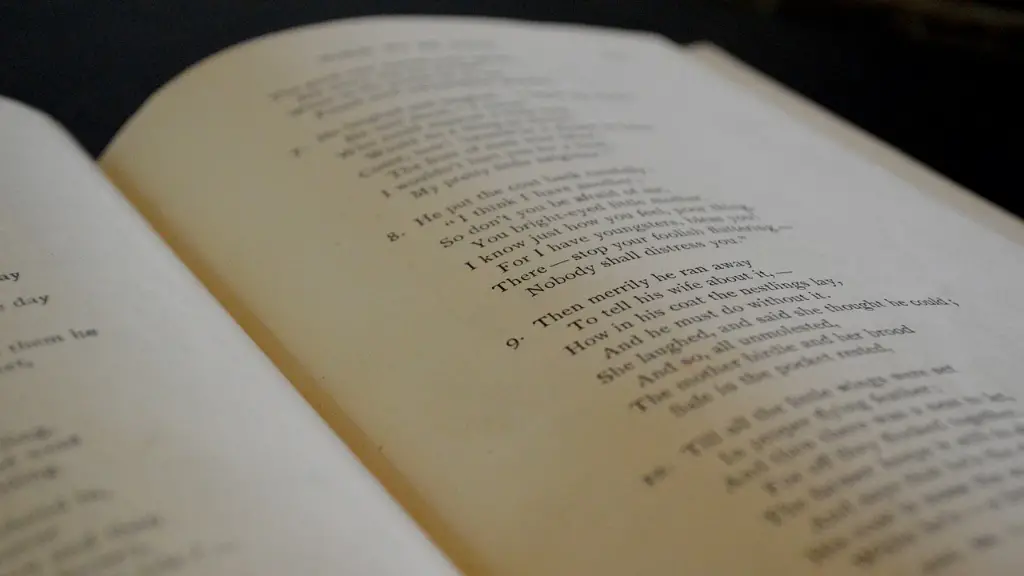Pablo Neruda was one of the greatest poets of the twentieth century and one of the most important Spanish-language authors of all time. His full name was Ricardo Eliécer Neftalí Reyes Basoalto, but he adopted the name Pablo Neruda when he first published his poems. He was born in Parral, Chile, in 1904, and was awarded the Nobel Prize for Literature in 1971. He became known for his passionate love poems, powerful political verses, and genres that blended lyrical and avant-garde styles. His poetry has been highly influential in Latin America and he is considered to be one of the major poets of the modern era.
Neruda’s real identity was discovered when he attended secondary school, so he adopted the pseudonym to write his first volume of poetry, titled “Crepusculario” (“Twilight”). His works often express a yearning for revolutionary transformation and included themes of love, nature, and humanity. Neruda wrote in an array of poetic styles and forms and was celebrated for his moving and accessible language. He was recognized for writing from both the heart and the head, with his works often offering a combination of personal emotion and political insight.
The themes of Neruda’s political poetry revolved around politics and injustice, offering readers a glimpse into unfairness and poverty that he experienced first-hand and witnessed throughout Latin America. His most famous political work is “Canto General,” a collection of 175 poems that detail colonial history, and the inevitable liberation of Latin America. Neruda served in numerous Chilean diplomatic posts, but after he was exiled in Mexico in 1949, his works became increasingly socio-political and highlighted injustices and the suffering of the people in Latin American countries.
Neruda’s works also draw on his deep admiration for everyday things, such as nature and simple objects. He also wrote about personal experiences and relationships, drawing on the intensity and beauty of love, as well as its pain. Neruda was dedicated to convincing non-poets of the true value of poetry, believing in its capacity to effect political change and display profound emotion that could be shared with the world. He once said “Give me my trumpet and I shall open the horizons so that others may vividly see the words of my heart”.
His Legacy
Neruda is considered to be one of the most influential and celebrated Latin American authors of the twentieth century. His works are still admired and respected for their political insight and emotional power. His work has had a lasting impact on subsequent movements of Latin American poetry, inspiring generations of writers to come. His extensive body of work has been translated into countless languages and celebrated all over the world. He was awarded Chile’s highest distinction in 1945, and honoured with both the International Peace Prize and the Nobel Prize for Literature.
Neruda was also greatly admired by political figures and ordinary people for his commitment to social justice and his support for leftist causes and revolutions. His words and works remain deeply loved to this day, and he stands as an inspiring figure for Latin American poets. His deep connection to and admiration of the natural world and everyday objects, his reverence for love, and his political activism, all remind us of his great and lasting influence.
His Works
Pablo Neruda was the author of numerous works of poetry, essays, translations and children’s books. He published well over 3000 works in his lifetime, with many more poems remaining unpublished. His works are widely studied and referred to in literature. Some of his most famous works include “Twenty Love Poems and a Song of Despair,” “Residence on Earth,” “Life While I Breathe” and “The General Music.”
Neruda was an incredibly prolific writer and was renowned for being able to write a new poem every day. He believed writing to be an essential part of life and said “For me, poetry is an inner need, a daily occupation, a frantic approach to life.” Neruda’s works remain abundantly anthologized and revered by poets and literature enthusiasts around the world.
His Love Life
Neruda was married three times throughout his life and had several other relationships. His first two marriages ended in divorce, while his final marriage to Matilde Urrutia proved to be the longest and most successful. Neruda and Matilde were married for eight years before Neruda’s death in 1973. In his memoir, Neruda wrote “love is an uncultivated garden in us, and it is up to us to tend it with care and understanding. When I went to live with Matilde I discovered a human being of a kind I had never expected. I found truths that I had never imagined.”
Neruda wrote numerous poems about the women in his life, reflecting the changing landscape of his relationships and demonstrating the intensity of his love and admiration for his partners. Neruda identified as a libertarian and believed in love as an intense and unique freedom. He wrote: “I love much and differently and so profoundly that I no longer count or measure love, or even conceive it as possessed by somebody. I don’t believe in jealous love; love should expand and be infinite, like music.”
His Death
Pablo Neruda died in 1973 at the age of 69. He was suffering from leukemia and his death was initially blamed on his cancer, but in recent years it has been suggested there may have been foul play involved. This could be linked to his strong political views, with some speculating that he may have been assassinated due to his support for socialism and opposition to the dictatorship in Chile. In 2013, a Chilean judge ordered the exhumation of Neruda’s remains, to investigate the possibility of a political murder. The results of the tests were inconclusive, so the mystery surrounding his death continues to this day.
His Literary Style
Pablo Neruda’s works have an interesting and unique literary style, full of vivid imagery and profound metaphors. His works often offer a combination of the personal and the political, revealing his passion for human rights and expressions of true love. Neruda’s works incorporate various poetic forms, rhythms, and tones to create captivatingly memorable verses. The topics of his works range from the everyday to the revolutionary, and are heavily characterized by a celebration of life, beauty, and love.
Neruda’s works live on in the minds and hearts of millions of people around the world, and he remains an iconic figure in the world of literature. He devoted his life to the art of words, and his works continue to inspire and move readers to this day.
His Language
Pablo Neruda primarily wrote and published his works in Spanish. He often wrote about the people and cultures of Latin America and was deeply committed to Latin American poetry and the Spanish language. His works showcased his love of his native language and the unique way in which he could express his identity, feelings, and ideas through it.
Neruda’s incredible use of language has allowed readers insight into his works and thoughts, no matter what language they speak. His language was sometimes complex and other times simple, but it is always powerful, with his words often providing commentary on the social and political environment of his home country and beyond.
His Impact
The influence of Pablo Neruda is far-reaching and profound. His works continue to inspire generations of writers, poets and readers. His words have been translated into countless languages and reached out to different countries and cultures, providing insight and provoking thought. His commitment to poetic expression and artistic form has left a lasting legacy on Latin American literature and is still influential in contemporary works.
Neruda’s works also demonstrate his commitment to the cause of social justice, offering a voice to the oppressed and the disadvantaged in Latin America. He stands as a symbol of strength and hope for those seeking change and justice, demonstrating the power of words to enact change on a larger scale.




